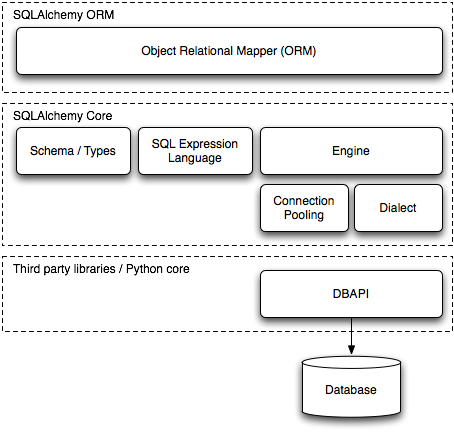Databases: SQLalchemy
Created for
What is an ORM?
What is an ORM?
Overview
- Object-Relational Mapping (ORM) is a technique that lets you query and manipulate data from a database using an object-oriented paradigm.
- Brings an abstraction level in communication with different databases, by wrapping DB actions in an idiomatic APIs.
- Provides automation and DRY
- Allow expression of DB/SQL tasks using declarative patterns
Analogy between Tables and Classes
CREATE TABLE users (
id serial primary key,
name character varying,
address character varying
)
class Users:
def __init__(self, name, address):
self.name = name
self.address = address
SQLAlchemy - the Python ORM
SQLAlchemy - the Python ORM
SimpleCompanyDB - the Model
- In next slides, in order to illustrate SQLAlchemy, I'll use a very simple model: SimpleCompanyDB
- You can download the MySQL dump: SimpleCompanyDB_dump

SimpleCompanyDB - the data
- DB engine used is MariaDB
- Next sample data are pre-populated into the database:
root@localhost:SimpleCompanyDB> SELECT * from company;
+--------------+----------------+
| company_id | company_name |
|--------------+----------------|
| 1 | Google |
| 2 | Facebook |
| 4 | Microsoft |
| 5 | Microsoft |
+--------------+----------------+
4 rows in set
Time: 0.002s
mariadb root@localhost:SimpleCompanyDB> SELECT * from employee;
+---------------+-----------------+
| employee_id | employee_name |
|---------------+-----------------|
| 1 | Ivan Petrov |
| 2 | Maria Popova |
| 3 | Georgi Ivanov |
+---------------+-----------------+
3 rows in set
Time: 0.005s
mariadb root@localhost:SimpleCompanyDB> SELECT * from company_employee
+---------------+--------------+
| employee_id | company_id |
|---------------+--------------|
| 1 | 2 |
| 2 | 1 |
| 3 | 1 |
| 3 | 2 |
+---------------+--------------+
4 rows in set
Overview
- SQLAlchemy is the Python SQL Toolkit and ORM
- Official site www.sqlalchemy.org

Overview
The SQLAlchemy flow:

SQLAlchemy Engines
- An Engine allows SQLAlchemy to interact with a database
- The typical usage of create_engine() is once per particular database URL, held globally for the lifetime of a single application process
engine = create_engine(
dialect+driver://username:password@host:port/database)
from sqlalchemy import create_engine
# connect to Mysql/MariaDB:
mysql_engine = create_engine(
"mysql+pymysql://user:pass@localhost/test")
# connect to PostgreSQL:
pg_engine = create_engine('postgresql://usr:pass@localhost/sqlalchemy')
Supported Databases/Dialects
- SQLAlchemy includes many Dialect implementations for various backends. Many other are available as external projects
- List and more information about dialects can be found on: Dialects
Create an engine to SimpleCompanyDB
from sqlalchemy import create_engine
#Create engine with MySQL dialect:
engine = create_engine(
'mysql+pymysql://pythontest:123@localhost/SimpleCompanyDB?charset=utf8',
connect_args = {
# 'port': 3306
},
# echo='debug',
echo_pool=True
)
# test the connection - get tables names:
print("Tables in SimpleCompanyDB: ",engine.table_names())
# Tables in SimpleCompanyDB: ['company', 'company_employee', 'employee']
The Declarative system
- SQLAlchemy uses a system known as Declarative, which allows us to create classes that include directives to describe the actual database table they will be mapped to.
- Classes mapped using the Declarative system are defined in terms of a base class which maintains a catalog of classes and tables relative to that base - this is known as the declarative base class.
from sqlalchemy.ext.declarative import declarative_base
Base = declarative_base()
SQLAlchemy Data Types
- SQLAlchemy provides abstraction for various data types used in most RBMS.
- Column and Data Types
class Address(Base):
__tablename__ = 'address'
# define columns for the table address.
id = Column(Integer, primary_key=True)
street_name = Column(String(250))
street_number = Column(String(250))
post_code = Column(String(250), nullable=False)
person_id = Column(Integer, ForeignKey('person.id'))
person = relationship(Person)
The Table object
- A table in a database is represented by an object of class Table
Create a table into SimpleCompanyDB
SQLAlchemy Relationships
- SQLAlchemy supports four types of relationships: One To Many, Many To One, One To One, and Many To Many
Example of One To Many relationship:
class Person(Base):
__tablename__ = 'person'
id = Column(Integer, primary_key=True)
pets = relationship("Pet")
class Pet(Base):
__tablename__ = 'pet'
id = Column(Integer, primary_key=True)
person_id = Column(Integer, ForeignKey('person.id'))
Example of Many To Many relationship
company_employee = Table('company_employee', Base.metadata,
Column('employee_id', Integer, ForeignKey('employee.employee_id')),
Column('company_id', Integer, ForeignKey('company.company_id'))
)
class Employee(Base):
__tablename__ = 'employee'
employee_id = Column(Integer, primary_key=True)
companies = relationship("Company", secondary=company_employee)
class Company(Base):
__tablename__ = 'company'
id = Column(Integer, primary_key=True)
SQLAlchemy Sessions
- Table
- Sessions are used to guarantee the database consistency.
- All modifications tracked by Sessions (Units of Works) will be applied to the underlying database together, or none of them will.
- More on Sessions: Session Basics @docs.sqlalchemy.org
Reflecting Database Objects
Reflecting Database Objects
Overview
- If a table already exists, SQLAlchemy can read its column definitions directly from the database.
- This processes is called reflecting the table.
Pandas and DB
Pandas and DB
DataFrame from MySQL table
import MySQLdb
mysql_cn= MySQLdb.connect(host='myhost',
port=3306,user='myusername', passwd='mypassword',
db='information_schema')
df_mysql = pd.read_sql('select * from VIEWS;', con=mysql_cn)
print 'loaded dataframe from MySQL. records:', len(df_mysql)
mysql_cn.close()
References
References
Readings
These slides are based on
customised version of
framework

